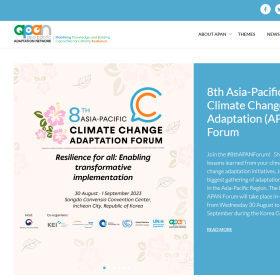In the face of escalating climate changes, effective Monitoring, Evaluation and Learning (MEL) processes are critical for gauging the effectiveness of interventions and shaping informed decisions. This page serves as a collection of available resources, offering invaluable insights, case studies, and tools tailored to empower policymakers, practitioners, and stakeholders in the Pacific Islands region to effectively undertake monitoring, learning and evaluation for projects, sectors and planning.
Creating partnerships - Resources
Pacific Island Forum
The Pacific Islands Forum is the region’s premier political and economic policy organisation. Founded in 1971, it comprises 18 members: Australia, Cook Islands, Federated States of Micronesia, Fiji, French Polynesia, Kiribati, Nauru, New Caledonia, New Zealand, Niue, Palau, Papua New Guinea, Republic of Marshall Islands, Samoa, Solomon Islands, Tonga, Tuvalu, and Vanuatu. The Forum’s Pacific Vision is for a region of peace, harmony, security, social inclusion and prosperity, so that all Pacific people can lead free, healthy, and productive lives. The Pacific Islands Forum works to achieve this by fostering cooperation between governments, collaboration with international agencies, and by representing the interests of its members.
Pacific Island Forum
The Pacific Islands Forum is the region’s premier political and economic policy organisation. Founded in 1971, it comprises 18 members: Australia, Cook Islands, Federated States of Micronesia, Fiji, French Polynesia, Kiribati, Nauru, New Caledonia, New Zealand, Niue, Palau, Papua New Guinea, Republic of Marshall Islands, Samoa, Solomon Islands, Tonga, Tuvalu, and Vanuatu. The Forum’s Pacific Vision is for a region of peace, harmony, security, social inclusion and prosperity, so that all Pacific people can lead free, healthy, and productive lives. The Pacific Islands Forum works to achieve this by fostering cooperation between governments, collaboration with international agencies, and by representing the interests of its members.

Asia Pacific Adaptation Network
The Asia Pacific Adaptation Network (APAN) is a regional programme for managing and applying adaptation knowledge in the region, and supports governments and other organisations working on adaptation, with special emphases on the management of knowledge and capacity building.

Asia Pacific Adaptation Network
The Asia Pacific Adaptation Network (APAN) is a regional programme for managing and applying adaptation knowledge in the region, and supports governments and other organisations working on adaptation, with special emphases on the management of knowledge and capacity building.
SAMOA Pathway (SIDS Accelerated Modalities of Action Pathway)
The SAMOA Pathway aims to address the unique challenges faced by Small Island Developing States (SIDS) and to support their development via the following objectives:
• Support the coordinated follow-up of the Programme of Action for the Sustainable Development of SIDS.
• Undertake advocacy work in favour of the small island developing States in partnership with the relevant parts of the United Nations as well as with the civil society, media, academia and foundations.
• Assist in mobilizing international support and resources for the implementation of the Programme of Action.
• Provide support to group consultations of SIDS.
• Ensure the mainstreaming of the SAMOA Pathway and SIDS-related issues in the work of the UN system and to enhance the coherence of SIDS issues in UN processes.
SAMOA Pathway (SIDS Accelerated Modalities of Action Pathway)
The SAMOA Pathway aims to address the unique challenges faced by Small Island Developing States (SIDS) and to support their development via the following objectives:
• Support the coordinated follow-up of the Programme of Action for the Sustainable Development of SIDS.
• Undertake advocacy work in favour of the small island developing States in partnership with the relevant parts of the United Nations as well as with the civil society, media, academia and foundations.
• Assist in mobilizing international support and resources for the implementation of the Programme of Action.
• Provide support to group consultations of SIDS.
• Ensure the mainstreaming of the SAMOA Pathway and SIDS-related issues in the work of the UN system and to enhance the coherence of SIDS issues in UN processes.
Regional Pacific Nationally Determined Contributions Hub
The Pacific NDC Hub is a coordinated regional support mechanism for Pacific Island Countries (PICs) to enhance, implement and finance their climate commitments. Countries can develop a request linked to enhancing or implementing their Nationally Determined Contributions (NDCs). Countries can submit their requests to the NDV Hub Implementation Unit, which identifies experts and consults with the country on the sustainability of the intervention. The NDC hub and country agree on how the request should be delivered and proceed with implementation.
Regional Pacific Nationally Determined Contributions Hub
The Pacific NDC Hub is a coordinated regional support mechanism for Pacific Island Countries (PICs) to enhance, implement and finance their climate commitments. Countries can develop a request linked to enhancing or implementing their Nationally Determined Contributions (NDCs). Countries can submit their requests to the NDV Hub Implementation Unit, which identifies experts and consults with the country on the sustainability of the intervention. The NDC hub and country agree on how the request should be delivered and proceed with implementation.

